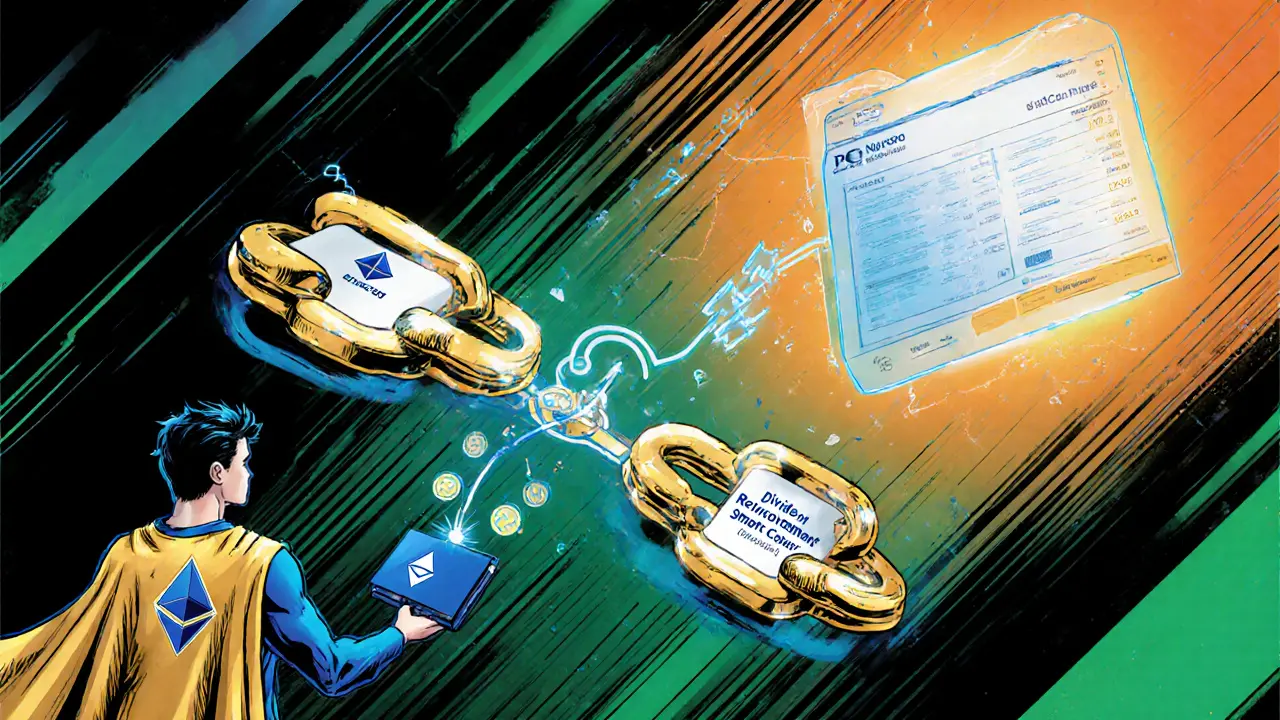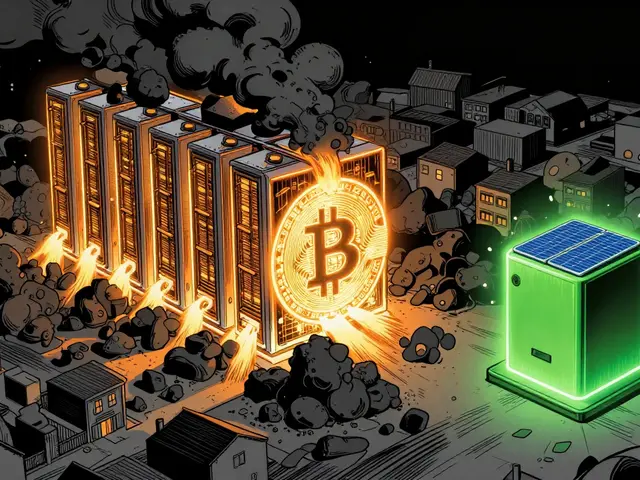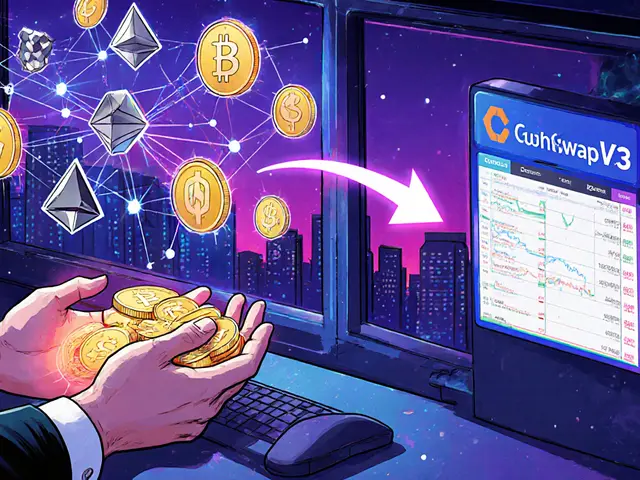Novo Nordisk Tokenized Stock (NVOon) Explained - What It Is and How It Works
NVOon Token Value Calculator
Calculate Your NVOon Investment Value
Enter your NVOon holdings to see the current value and potential returns.
Investment Summary
Your 0 NVOon tokens are valued at $0.00.
With an annual dividend rate of 1.20%, your estimated annual income is $0.00.
Assuming dividend reinvestment, your tokens will grow to approximately $0.00 in one year.
Quick Summary
- NVOon is an ERC‑20 token that mirrors the economic performance of Novo Nordisk shares.
- Issued by Ondo Finance, it automatically reinvests any dividends earned.
- Regulated under the U.S. SEC Reg.S exemption and hosted on the Ethereum blockchain.
- Liquidity is low - trading volume often stays under $100k a day.
- Investors need an Ethereum wallet, ETH for gas, and a DEX or exchange that lists NVOon.
What Is Novo Nordisk Tokenized Stock (Ondo) (NVOon)?
When you hear Novo Nordisk tokenized stock is a blockchain‑based representation of Novo Nordisk A/S shares created by Ondo Finance. The token, traded under the ticker NVOon, follows the ERC‑20 standard on Ethereum and gives holders the same economic exposure as owning the underlying stock, including automatic dividend reinvestment. In simple terms, owning NVOon is like holding a digital slice of the Danish pharmaceutical giant without opening a traditional brokerage account.
How Does the Token Work?
Two technical pieces make NVOon possible:
- ERC‑20 standard: The token lives on Ethereum, so any wallet that supports ERC‑20 can hold it. The contract address starts with 0x281…b193e3.
- Dividend‑reinvestment smart contract: When Novo Nordisk pays a dividend, the contract captures the cash flow, converts it to ETH, and then mints additional NVOon tokens for every holder. This keeps the token’s net asset value (NAV) aligned with the stock’s total return.
Because the token is always on‑chain, you can trade it 24/7 on compatible DEXs or on a few centralized exchanges that have added the pair.
Legal and Regulatory Framework
The token is not a free‑floating cryptocurrency; it’s classified as a security token. Ondo Finance registered the offering under the U.S. Securities Act Reg.S exemption, meaning it’s only sold to non‑U.S. investors or qualified institutional buyers. The token operates under the jurisdiction of the British Virgin Islands, but the SEC retains oversight for any U.S.‑related activity.
Key regulatory attributes:
- Regulated security - investor must understand securities law.
- Limited voting rights - token holders cannot vote at Novo Nordisk shareholder meetings.
- Compliance reporting - Ondo Finance must file periodic disclosures to maintain the exemption.

Current Market Snapshot
Data from September2025 shows wild discrepancies across tracking sites, a common trait for niche tokenized securities. Below is a side‑by‑side view of the most cited figures.
| Source | Total Supply | Circulating Supply | Price (USD) | 24‑hr Volume (USD) | Market Cap (USD) |
|---|---|---|---|---|---|
| Phantom.com | 26,654.68 | 26,654.68 | 55.78 | 32,595 | 1,500,000 |
| RWA.xyz | 43,281.94 | 43,281.94 | 55.55 | 77,540 | 2,406,908 |
| CoinMarketCap | ≈26,600 | ≈26,600 | 54.13 | - | ≈1,440,000 |
The token’s ranking - #1,802 on CoinMarketCap and #4,471 on CoinGecko - tells you it’s a very small‑cap asset, far behind Bitcoin or Ethereum.
Benefits and Drawbacks
Every investment has a trade‑off. Here’s a quick pros‑cons list that reflects real‑world usage.
- Pros
- 24/7 global trading - no stock‑exchange opening hours.
- Fractional ownership - you can buy 0.001NVOon if full tokens feel pricey.
- Automatic dividend reinvestment - eliminates manual paperwork.
- Access for non‑EU residents who can’t open a Danish brokerage.
- Cons
- Liquidity is thin; large orders can cause sizable slippage.
- Regulatory risk - SEC guidance on tokenized securities is still evolving.
- Smart‑contract risk - bugs or hacks could affect token balances.
- No voting rights in Novo Nordisk’s shareholder meetings.
How to Acquire NVOon
Getting your hands on NVOon isn’t as simple as buying a well‑known meme coin, but it’s doable with a few steps:
- Set up an Ethereum‑compatible wallet (MetaMask, Trust Wallet, or any hardware wallet that supports ERC‑20).
- Buy a small amount of ETH to cover gas fees - typically $5‑$10 worth is enough for a single trade.
- Transfer ETH to the wallet address you’ll use for the purchase.
- Visit a DEX that lists NVOon, such as Uniswap or SushiSwap. Paste the contract address 0x281…b193e3 into the “Import Token” field.
- Swap ETH for NVOon, keeping an eye on slippage settings (set a max of 1‑2% for safety).
- If you prefer a centralized venue, check Crypto.com or Binance’s “Tokenized Stocks” sections - they sometimes list NVOon via a wrapped representation.
After the trade, you’ll see NVOon appear in your wallet’s token list. Most wallets will show the token name, ticker and the quantity you own.
Risks and Safety Tips
Investing in a security token adds layers of complexity beyond a regular crypto purchase.
- Regulatory uncertainty: A future SEC ruling could restrict trading or require token holders to register.
- Smart contract bugs: Verify that the contract address matches official Ondo Finance documentation; avoid copying from unknown forums.
- Liquidity crunch: With daily volumes under $100k, expect price swings if you sell a large chunk.
- Price‑stock disconnect: While the token aims to track Novo Nordisk’s total return, market sentiment can cause short‑term deviations.
- Custodial risk: Storing the token in a non‑custodial wallet is safest. If you use an exchange, you’re reliant on their security practices.
Bottom line: Treat NVOon like you would any other equity - do your homework, diversify, and only allocate money you can afford to lose.
Frequently Asked Questions
What does NVOon actually represent?
NVOon is an ERC‑20 token that gives the holder the same economic payoff as owning Novo Nordisk A/S shares, including dividend reinvestment, but without voting rights.
Can I vote in Novo Nordisk shareholder meetings with NVOon?
No. Token holders receive economic benefits only. Voting rights stay with registered shareholders of the actual stock.
Is NVOon regulated?
Yes. It is offered under the U.S. SEC Reg.S exemption and falls under securities law in most jurisdictions.
How are dividends handled?
When Novo Nordisk declares a dividend, the smart contract receives the cash, converts it to ETH, and mints additional NVOon tokens for each holder, effectively reinvesting the dividend automatically.
Where can I buy NVOon?
You can purchase it on decentralized exchanges like Uniswap by importing the contract address, or on a few centralized platforms that list tokenized stocks, such as Crypto.com.
What are the main risks?
Key risks include regulatory changes, smart‑contract bugs, low liquidity, and possible price drift from the underlying Novo Nordisk share price.
Do I need a special wallet?
Any Ethereum‑compatible wallet that supports ERC‑20 tokens works - MetaMask, Trust Wallet, Ledger, Trezor, etc.
How does NVOon’s price relate to Novo Nordisk’s stock price?
The token’s price aims to track the total return of Novo Nordisk shares (price plus reinvested dividends). Short‑term market sentiment can cause deviations, but over longer periods they tend to converge.

Next Steps for Prospective Investors
If you’ve decided NVOon fits your portfolio, follow this checklist:
- Read Ondo Finance’s official security‑token prospectus (PDF) to confirm Reg.S eligibility.
- Set up a non‑custodial Ethereum wallet and secure the seed phrase.
- Buy a modest amount of ETH for gas.
- Execute a small test trade (e.g., 0.01NVOon) on a DEX to gauge slippage.
- Monitor the token’s NAV versus Novo Nordisk’s share price weekly.
- Stay updated on SEC and BVI regulatory news - a change could affect trading ability.
Remember, tokenized stocks are still a niche experiment. Treat them as a complement to traditional investments, not a replacement.






21 Comments
Sophie Sturdevant
July 24 2025Alright, let’s break this down. The NVOon token is essentially a security token that mirrors Novo Nordisk’s equity, built on an ERC‑20 framework, which means you get blockchain‑level settlement speed while still holding an actual share proxy. Because it’s tokenized, you can trade 24/7 on compliant DEXs, unlocking liquidity that traditional ADRs simply can’t provide. The dividend mechanics are handled via smart‑contract‑driven distribution, so you’ll receive the 1.20% yield straight into your wallet, auto‑reinvested if you enable the feature. Think of it as a hybrid instrument: classic equity economics supercharged by decentralized finance protocols. If you’re looking to hedge exposure to insulin‑market dynamics, this token gives you granular position sizing down to a single token, no need to buy a full block of shares. The downside risk is regulatory friction – any change in securities law could temporarily freeze token transfers. So, stay vigilant, monitor the custodial issuer’s compliance reports, and you’ll be able to capture upside while mitigating the friction of traditional stock markets.
Jan B.
July 26 2025The tokenized share works like a normal stock but lives on a blockchain. You hold the token, you get the same dividend rights as a regular shareholder. The calculator just multiplies your token amount by the current price and applies the dividend rate. Keep an eye on market price fluctuations – they affect your total value instantly.
MARLIN RIVERA
July 29 2025This whole NVOon gimmick is just another piece of hype designed to sell you a digital wrapper for a pharmaceutical company. The underlying fundamentals haven’t changed; you’re still subject to the same market risks, and now you have an extra layer of smart‑contract risk. Don’t be fooled by the shiny UI – it’s still a stock, not a miracle investment.
emmanuel omari
August 1 2025From a regulatory perspective, tokenized equities must comply with both securities law and blockchain AML/KYC requirements. The issuer likely secured a qualified exemption or a full registration with the relevant authorities, which means the token is legally equivalent to the underlying share. However, cross‑border investors should verify that their jurisdiction recognizes such tokenized assets, otherwise they could face tax or reporting complications.
Andy Cox
August 4 2025Looks like a fancy spreadsheet.
Sidharth Praveen
August 7 2025Hey folks, this is a solid way to get exposure to Novo Nordisk without the usual broker fees. The dividend reinvestment feature can compound nicely over time, especially if the token’s price stays stable. Just remember to keep your private keys safe – losing them means losing your shares.
Richard Herman
August 9 2025Tokenizing a stable pharma giant like Novo Nordisk is an interesting experiment. It blends traditional equity benefits with the frictionless nature of crypto. For long‑term investors, the 1.20% dividend can serve as a modest income stream while you wait for the token’s market liquidity to mature.
Parker Dixon
August 12 2025Alright, let’s unpack this tokenized stock from several angles.
First, the mechanics: NVOon is an ERC‑20 security token that represents fractional ownership of Novo Nordisk shares, meaning each token is backed 1:1 by a physical share held in escrow. This structure allows you to buy, sell, or transfer ownership instantly on a compliant exchange, bypassing the traditional settlement cycles that can take days.
Second, the dividend pipeline: The token’s smart contract is programmed to capture the 1.20% annual dividend and automatically credit token holders’ wallets. You can opt into a reinvestment scheme, which effectively compounds your earnings without you having to manually purchase additional tokens each quarter.
Third, risk considerations: While the token itself is transparent and auditable on the blockchain, you’re still exposed to the underlying company’s performance, market volatility, and regulatory changes. A sudden shift in securities law could temporarily restrict token transfers or impact the custodian’s ability to distribute dividends.
Fourth, tax implications: Depending on your jurisdiction, you may still be liable for capital gains tax when you sell tokens, and dividend income could be taxed as ordinary income. It’s wise to consult a tax professional familiar with crypto assets.
Fifth, liquidity: Because this is a niche security token, market depth might be limited compared to major crypto assets. Expect wider bid‑ask spreads and possibly lower trading volume, especially during off‑peak hours.
Sixth, custodial safety: The escrow provider must be a reputable entity with insurance coverage for the underlying shares. Verify their audit reports and understand the process for reclaiming the physical share in case of a custodial failure.
Seventh, diversification: Holding tokenized stocks can complement a broader crypto portfolio, adding exposure to a stable, dividend‑paying pharma giant while still keeping the benefits of blockchain transparency and programmability.
Eighth, community support: Many platforms now offer staking or yield‑enhancement programs for security tokens, potentially boosting your effective return beyond the base dividend.
In summary, NVOon offers a blend of traditional equity benefits and modern blockchain convenience. If you’re comfortable navigating the regulatory and custodial nuances, it can be a valuable addition to a diversified long‑term strategy.
Stefano Benny
August 15 2025Interesting recap, but let’s not ignore the fact that the market makers for NVOon are still thin. The token’s price can swing wildly on low volume, which means your computed dividend might look great on paper while you’re actually losing on the spread. 🤷♂️
Bobby Ferew
August 18 2025Honestly, many people get swept up in the excitement of “blockchain” without realizing they’re just holding a glorified share certificate. The jargon can feel fresh, but at the end of the day the fundamentals haven’t changed, and the token’s performance will still track Novo Nordisk’s stock.
celester Johnson
August 21 2025One could argue that the very act of tokenizing equity represents a philosophical shift in ownership semantics – moving from paper‑based entitlement to code‑based rights. Yet, this abstraction does not exempt investors from the age‑old principle that risk follows reward, regardless of whether the ledger is digital.
Prince Chaudhary
August 24 2025Exactly, stay focused on the fundamentals and keep your private keys secure. If the custodial bridge fails, you could lose the underlying asset entirely, so always have a contingency plan.
John Kinh
August 26 2025Meh, looks like another crypto‑finance gimmick to me. I’ll wait for real adoption before putting any money in.
Mark Camden
August 29 2025It is essential to recognize that tokenized securities must adhere to strict compliance frameworks. Any deviation could result in legal repercussions for both issuers and holders, undermining the purported benefits of decentralization.
Evie View
September 1 2025Honestly, the whole tokenized stock thing feels like a buzzword parade. If you’re not careful, you’ll get sucked into the hype and lose money.
Nathan Blades
September 4 2025The convergence of traditional finance and decentralized technology is nothing short of revolutionary. When a mature pharma company like Novo Nordisk embraces tokenization, it signals a broader acceptance of blockchain as a legit financial infrastructure, potentially paving the way for more mainstream adoption.
Somesh Nikam
September 7 2025From a coaching perspective, think of NVOon as a tool to diversify your portfolio without the friction of conventional brokerage accounts. Set clear goals, monitor the token’s price movements, and reinvest dividends to accelerate growth.
Debby Haime
September 9 2025Stay motivated, folks! Even a modest 1.20% dividend can add up over time, especially when you let the compounding work its magic through the token’s reinvestment feature.
Courtney Winq-Microblading
September 12 2025Philosophically, the token represents a bridge between the tangible world of pharmaceuticals and the intangible realm of digital assets, challenging our notions of ownership and value.
katie littlewood
September 15 2025Let’s take a moment to really savor the richness of this development, shall we? The tokenization of Novo Nordisk stock, known in the crypto‑sphere as NVOon, is not merely a superficial veneer of innovation; it is a profound reimagining of how equity can be interacted with in the digital age. By encapsulating each share within an ERC‑20 contract, the creators have afforded investors the ability to slice their exposure into granular units, which, in turn, democratizes access for those who might have previously found the barrier of entry prohibitive. Moreover, the automated dividend distribution mechanism leverages the immutable nature of smart contracts, ensuring that the 1.20% yield is allocated with precision and timeliness, thereby eliminating the oft‑cumbersome paperwork associated with traditional dividend payments. The potential for reinvestment is a particularly elegant facet, allowing holders to compound returns without ever having to lift a finger-a true testament to the power of code‑driven finance. Yet, one must not overlook the regulatory intricacies that accompany such a venture; compliance with securities law, anti‑money‑laundering statutes, and cross‑border tax obligations is paramount, lest the very foundation of the token be compromised. In the broader context, this initiative may serve as a bellwether, heralding a wave of tokenized equities that could reshape capital markets, fostering greater liquidity, transparency, and inclusivity. As we stand at the cusp of this transformation, it is incumbent upon us to engage with both optimism and prudence, appreciating the aesthetic beauty of this innovation while remaining vigilant to its inherent risks.
Jenae Lawler
September 18 2025While some herald tokenized equities as the future, one must critically assess whether this apparatus merely repackages existing financial structures under a veneer of sophistication. The elevated rhetoric risks obscuring the fact that investors are still subject to the same market forces, regulatory constraints, and custodial vulnerabilities as before, albeit presented in a more fashionable syntax.